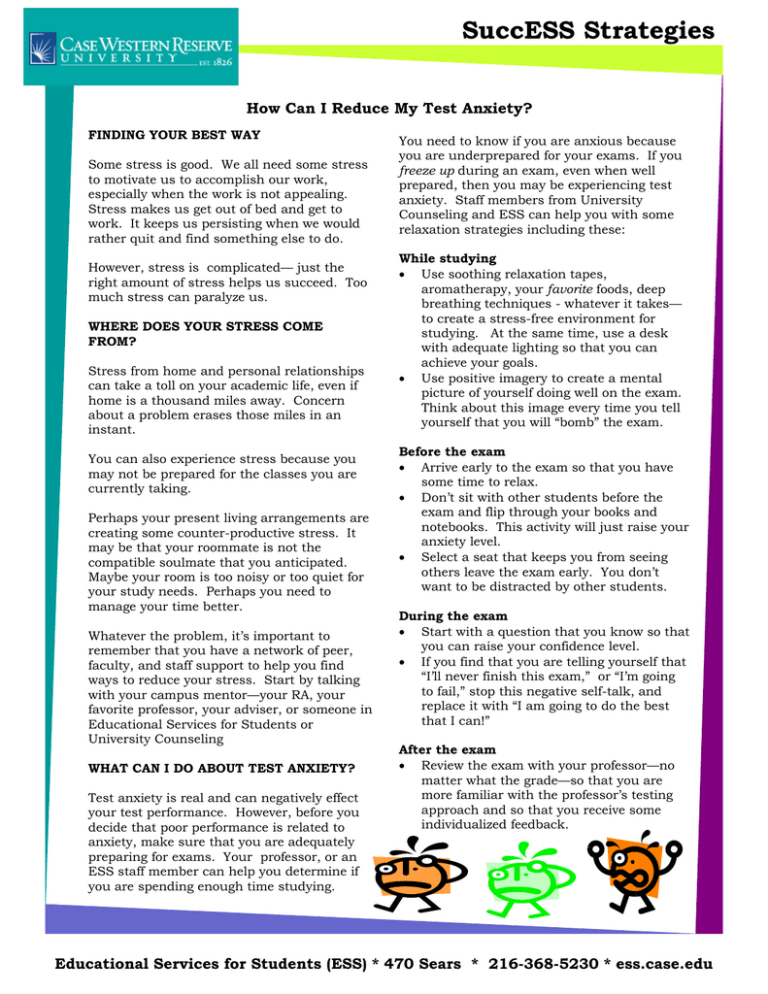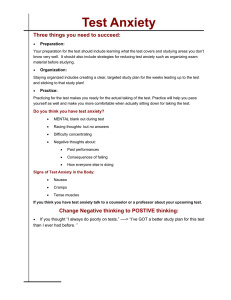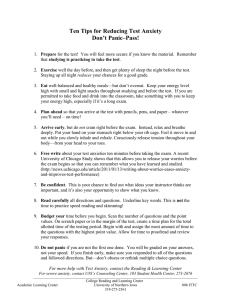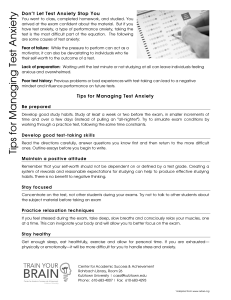How Can I Reduce My Test Anxiety?
advertisement

SuccESS Strategies How Can I Reduce My Test Anxiety? FINDING YOUR BEST WAY Some stress is good. We all need some stress to motivate us to accomplish our work, especially when the work is not appealing. Stress makes us get out of bed and get to work. It keeps us persisting when we would rather quit and find something else to do. However, stress is complicated— just the right amount of stress helps us succeed. Too much stress can paralyze us. WHERE DOES YOUR STRESS COME FROM? Stress from home and personal relationships can take a toll on your academic life, even if home is a thousand miles away. Concern about a problem erases those miles in an instant. You can also experience stress because you may not be prepared for the classes you are currently taking. Perhaps your present living arrangements are creating some counter-productive stress. It may be that your roommate is not the compatible soulmate that you anticipated. Maybe your room is too noisy or too quiet for your study needs. Perhaps you need to manage your time better. Whatever the problem, it’s important to remember that you have a network of peer, faculty, and staff support to help you find ways to reduce your stress. Start by talking with your campus mentor—your RA, your favorite professor, your adviser, or someone in Educational Services for Students or University Counseling WHAT CAN I DO ABOUT TEST ANXIETY? Test anxiety is real and can negatively effect your test performance. However, before you decide that poor performance is related to anxiety, make sure that you are adequately preparing for exams. Your professor, or an ESS staff member can help you determine if you are spending enough time studying. You need to know if you are anxious because you are underprepared for your exams. If you freeze up during an exam, even when well prepared, then you may be experiencing test anxiety. Staff members from University Counseling and ESS can help you with some relaxation strategies including these: While studying • Use soothing relaxation tapes, aromatherapy, your favorite foods, deep breathing techniques - whatever it takes— to create a stress-free environment for studying. At the same time, use a desk with adequate lighting so that you can achieve your goals. • Use positive imagery to create a mental picture of yourself doing well on the exam. Think about this image every time you tell yourself that you will “bomb” the exam. Before the exam • Arrive early to the exam so that you have some time to relax. • Don’t sit with other students before the exam and flip through your books and notebooks. This activity will just raise your anxiety level. • Select a seat that keeps you from seeing others leave the exam early. You don’t want to be distracted by other students. During the exam • Start with a question that you know so that you can raise your confidence level. • If you find that you are telling yourself that “I’ll never finish this exam,” or “I’m going to fail,” stop this negative self-talk, and replace it with “I am going to do the best that I can!” After the exam • Review the exam with your professor—no matter what the grade—so that you are more familiar with the professor’s testing approach and so that you receive some individualized feedback. Educational Services for Students (ESS) * 470 Sears * 216-368-5230 * ess.case.edu



